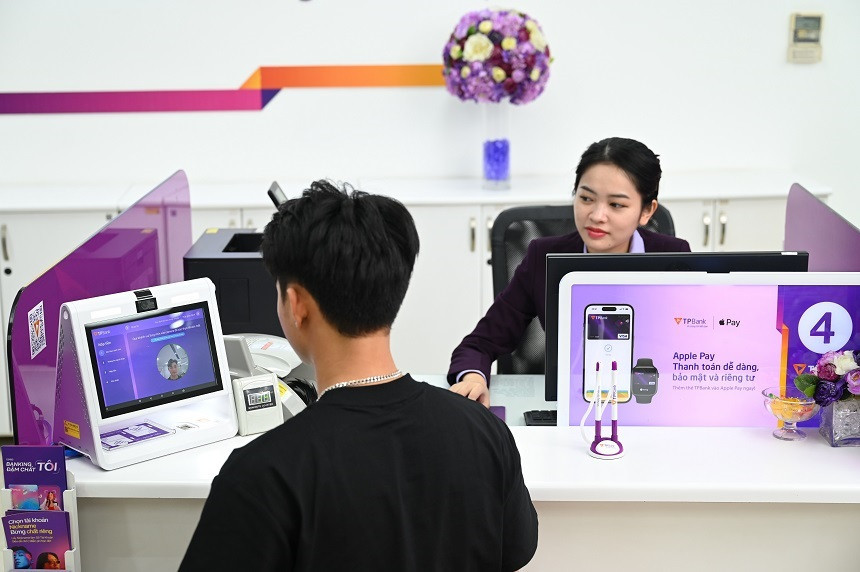
According to Decision 2345/QD-NHNN, starting July 1, 2024 money transfers of 10 million VND per transaction or a total daily transaction value exceeding 20 million VND will require biometric face authentication.
Additionally, according to Clause 2 of Decision 2345, individual customers must be biometrically identified before making their first transaction using a banking application (Mobile Banking) or before making a transaction on a different device than the one used for the last transaction.
Deputy Governor of the State Bank of Vietnam (SBV) Pham Tien Dung stated that with the application of Decision 2345, facial recognition must be matched and authenticated during transactions, preventing criminals from stealing money.
Importantly, criminals often attempt to appropriate information by installing it on another device. However, banks require biometric authentication, thus preventing such attempts. Additionally, individuals renting or leasing accounts cannot use these transaction accounts under the new regulations.
Explaining the choice of the 10 million VND threshold, Mr. Dung shared that transactions over 10 million VND account for only 11% of the total transaction volume. The total number of people with transactions over 20 million VND per day is less than 1%. Therefore, it is impractical to require facial authentication for minor transactions, like paying for a bottle of water or a bus ticket.
The Deputy Governor emphasized: "It is not true that after making a transaction of 20 million VND, a subsequent transaction of 100,000 VND will require biometrics again. We authenticate at the 20 million VND level, and further authentications are not needed until the next 20 million VND transaction."
This regulation will help eliminate accounts not in the owner's name or opened with fake documents.
Mr. Pham Anh Tuan, Director of the Payment Department at SBV, clarified that the regulation only applies to normal money transfer transactions, not to payment transactions where the recipient is clearly defined.
"I want to clarify that it is a money transfer transaction," Mr. Pham Anh Tuan emphasized. All payment transactions accepted by payment units, credit institutions, and payment intermediaries that have been authenticated do not require biometric authentication. For example, paying for electricity, water, taxes, or transportation fees does not require biometric authentication if the transaction has a clear destination,” Tuan said.
Recently, the State Bank of Vietnam issued Document No. 4932/NHNN-TT to the People's Committees of provinces and cities to coordinate in preventing the buying and selling of student accounts.
In many localities, criminals have recently lured students who have been issued ID cards to open payment accounts, paying them to do so. These criminals provide students with phones with pre-installed SIM cards to register for opening payment accounts and Internet Banking and SMS Banking services. They then collect the phones, login information, passwords, authentication passwords (OTP), and even biometric data (face) to verify the identity of customers when required.
These accounts are often exploited for illegal purposes such as money laundering, tax evasion, fraud, and terrorism financing.
The document from the State Bank clearly outlines the prohibited acts under Article 6 of Decree 101/2012/ND-CP and Decree No. 52/2024/ND-CP, including providing dishonest information in the process of providing and using payment services, opening or maintaining anonymous or impersonated payment accounts, and buying, selling, renting, leasing, or borrowing payment accounts.
Violations will result in administrative sanctions according to Clause 5, 6, Article 26 of Decree 88/ND-CP dated November 14, 2019, including fines of 40 million to 50 million VND for renting, leasing, borrowing, lending, buying, or selling 1 to less than 10 payment accounts, and fines of 50 million to 100 million VND for 10 or more payment accounts not yet subject to criminal prosecution.
The SBV has regularly issued directives to review and inspect account records that do not match identity documents, explore solutions using national population data, and utilize data on chip-embedded ID cards.
According to Mr. Pham Anh Tuan, by the end of 2023, Vietnam had more than 182 million payment accounts of individual customers, with 87.08% of adults having bank accounts. Many banks have processed over 95% of transactions through digital channels, and the number of payment transactions via mobile devices and QR codes has grown rapidly in recent times.
Tuan Nguyen